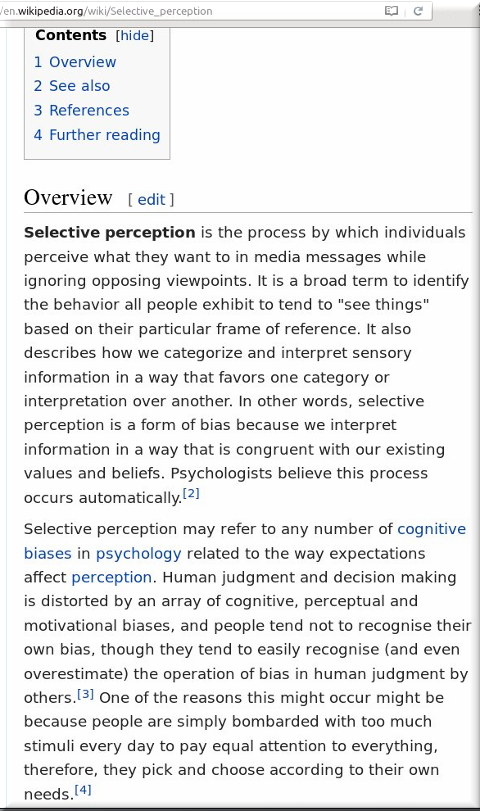
 Reference: Selective perception
Reference: Selective perception
THE USPTO gradually moves away from software patents, whereas the EPO moves closer to them. That's quite a twist and an unexpected development, but that's where we are today.
“In a nutshell, PTAB survives and all those cranky patent lawyers who compared it to a "death squad" will have to find another lobbying strategy.”Cuozzo coverage from MIP's Natalie Rahhal said that the "Supreme Court’s decision in Cuozzo v Lee maintains the different standards for claim construction used in the Patent Trial and Appeal Board (PTAB) and the district courts. The ruling indicates that the Court believes the USPTO is performing its inter partes reviews (IPR) in accordance with the America Invents Act (AIA)."
In a nutshell, PTAB survives and all those cranky patent lawyers who compared it to a "death squad" will have to find another lobbying strategy. TechDirt wrote about the decision as follows:
Supreme Court Says, Yes, The Patent Office Can Review Crappy Patents Using Broad Standards
Last week, the Supreme Court made life a little easier for patent trolls, and this week it made life a little harder. At issue was just how the Patent Office could review patents after they were granted. The last round of patent reform, the America Invents Act in 2010, included something called Inter Partes Review (IPR) that allows anyone to basically challenge a bad patent, presenting specific evidence that it shouldn't have been granted due to prior art. A special board at the Patent Office, the Patent Trial and Appeal Board (PTAB), can then decide to review the patent if it decides that there's a "reasonable likelihood" that it will invalidate some of the patent claims due to the submitted evidence.
In the case that went to the Supreme Court, Cuozzo Speed Technologies was upset that the PTAB knocked out some patent claims on a patent it held after Garmin filed an IPR effort with the Patent Office, claiming that one of the claims in a Cuozzo patent was invalid thanks to prior art. The PTAB knocked out three claims from the patent, saying that two other claims were equally impacted from the prior art. Cuozzo appealed to the Federal Circuit (CAFC) on two points: first it was upset that the PTAB reviewed three claims when Garmin really focused on just one. And, second, it was upset that the PTAB used "the broadest reasonable construction" of the claims rather than the "ordinary meaning as understood by a person of skill in the art." CAFC sided with the PTAB, saying that the law says that you can't appeal what PTAB chooses to review, and that the standard it used was perfectly reasonable.
"There is not much coverage of this from pro-software patents people, as one might expect. It's that propaganda by omission as we noted here before."Here is IP Kat's very latest on SCOTUS. It mentions the Halo case (pro-patent trolls) and says: "Is the U.S. Supreme Court pro-patent or anti-patent? One of my favorite books on patent reform is by economists Adam B. Jaffe and Josh Lerner titled, "Innovation and its Discontents: How Our Broken Patent System is Endangering Innovation and Progress and What to do About It," published in 2004 by Princeton University Press. One of the insights from the book is the recognition of how patent legal protection moves like a pendulum throughout history. Notably, we tend to swing either too far in favor of protection or too far away from protection. We have trouble finding the middle way. On June 13, 2016, the U.S. Supreme Court in Halo Electronics v. Pulse Electronics and Stryker Corp. v. Zimmer (Halo) made it easier to obtain enhanced damages for willful infringement in patent infringement cases."
It's not a bad post actually and a comment on the above says: There is a clear common theme among most of the patent cases decided by the US Supreme Court in the last couple of years: the CAFC should stop laying down hard-and-fast rules for judging inventive step, patent-eligibility, damages, attorney fees, injunctions, etc. etc. etc. If there is a connection with fear for patent trolls, it is probably that inflexible rules create too many opportunities for abuse."
"Funny how they mostly evade cases that are not -- shall we say -- so "convenient" to patent lawyers..."In this particular case not patent scope but the scope of damages was at stake. Those quite likely to benefit from this decision are patent trolls, which most often use patents on software (hence the relevance to patent scope too). IP Kat has also just published this
analysis from Taly Dvorkis (Allen & Overy LLP). It's about the Halo case as well. Funny how they mostly evade cases that are not -- shall we say -- so "convenient" to patent lawyers... this particular analysis was posted by a Bristows employee and longtime proponent of software patents, the UPC, etc.
To be frank, my feelings towards IP Kat soured recently, especially in light of the censorship. It's not about my particular comment but about input I receive about other people whose comments too are being censored, presumably for not concurring with the 'party line' (I have repeatedly asked IP Kat on what basis my comment was deleted and I am still waiting for a response, probably in vain). The worst situation is one where people like Merpel hardly write anymore and people from patent law firms write the lion's share of the blog's articles. "I'm fully aware of this," told us someone from the EPO about IP Kat. "Unfortunately I have to agree with you and since Jeremy left the Kat their EPO reports leave a lot to be desired. Also the frequency of reporting (as you already mentioned in Techrights before) dropped remarkably. I suspect pressure from the Dark side..." (EPO management, which earlier this month banned IP Kat). ⬆